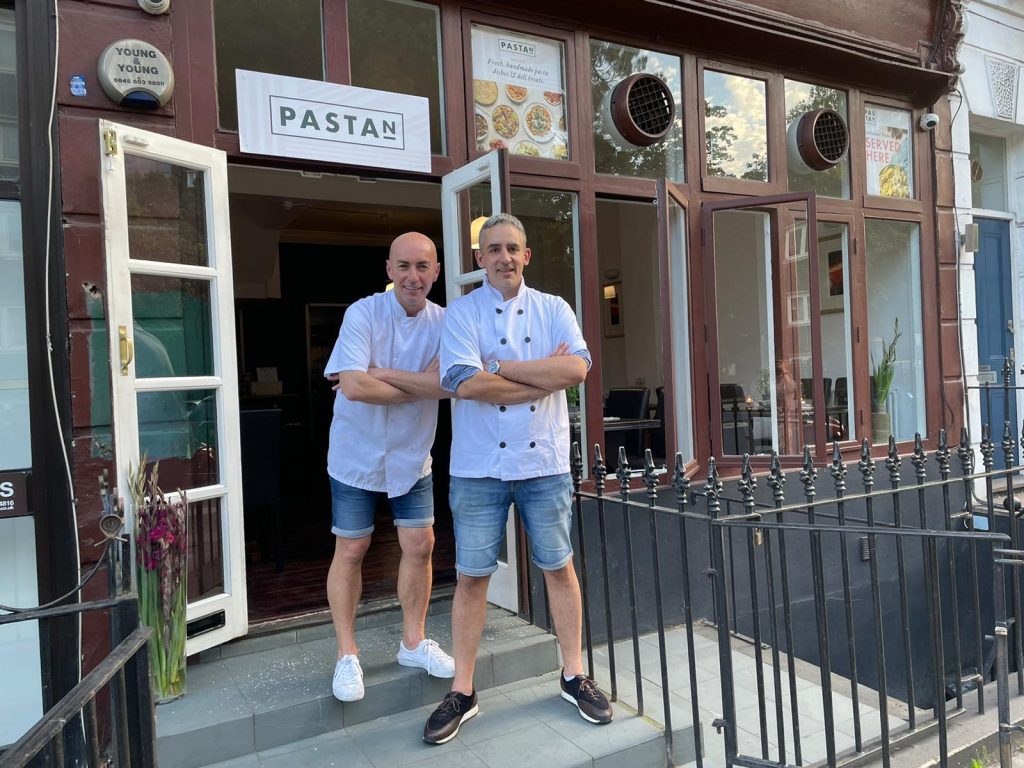Expert insights from plant-based restauranteur, Jérôme Ibanez
Food service venues offer a perfect stage for plant-based food; a prime opportunity for chefs and culinary creatives to show off the space at its very best. What better way to experience plant-based food than when it has been professionally conceived and prepared for you?
Recently, the New Food Hub had the pleasure of sitting down with Jérôme Ibanez, co-founder of UK-based plant-based Italian restaurant, Pastan. The eatery’s journey from pop-up to pasta paradise is nothing short of inspiring.
In our 14-minute chat, Ibanez shares his insights on what makes Pastan a hit, their target consumer, and strategies for luring flexitarians into the world of plant-based dining.
Watch the full interview above or read the highlights below!
Pastan’s remarkable journey
Pastan’s journey began in the midst of the pandemic in late 2020, when Jérôme and his partner, Dean Fawcett, decided to create a plant-based Italian restaurant. Their passion for fresh pasta led them to develop a unique but comforting menu.
Initially launching via dark kitchens and food delivery platforms, Pastan faced challenges due to limited brand awareness. On top of this, the vegan segment still had a low presence on delivery apps, which meant that uptake was slow.

Undeterred, they opened their first pop-up in Covent Garden, London, in April 2021. At first, diners were hesitant. But the tide turned when Sophie Weir, Pastan’s Marketing Manager, took charge of their social media presence and they reframed from ‘vegan’ to ‘plant-based’. With captivating food photography and an engaging online presence, Pastan started attracting a loyal following. After a month, business picked up, and soon enough, they opened more pop-ups, including one in Bristol.
The final leap was to open their first permanent restaurant in November 2021 in London’s Barbican. Pastan’s remarkable journey showcases their determination and the potential for plant-based dining in the UK.
Now, Pastan has three sites in the UK – London, Bristol, and Manchester, and also a site in Barcelona, Spain.
Attracting flexitarians and non-vegans
The secret to attracting flexitarians and non-vegan diners to plant-based restaurants, like Pastan, lies in comfort, familiarity, and the universal appeal of pasta, according to Jérôme. Pasta is a comfort food enjoyed by people of all ages. Pastan’s menu includes both familiar favourites and creative dishes, making it accessible to a wide range of diners.
Furthermore, Pastan benefits from “collateral customers” who visit due to recommendations from plant-based friends and family. They also attract conscious consumers who recognise the environmental and ethical benefits of plant-based eating.
Sophie emphasises their marketing strategy, which highlights the flavour and excitement of their dishes. Collaborations with other plant-based brands and platforms like HappyCow help spread the word about Pastan.
Mainstream lessons from plant-based eateries
Jérôme advises mainstream omnivorous chains to create a welcoming plant-based menu. It should go beyond offering “just a vegan burger” and instead feature a variety of well-thought-out dishes. Consistency in menu offerings and monthly updates can keep customers engaged.

Collaborating with plant-based brands, employing a plant-based chef, and promoting plant-based dishes through takeaway apps and platforms can help mainstream chains tap into the growing plant-based market.
Overcoming challenges
One of the biggest challenges in the food service industry, according to Jérôme, is capturing a broader audience while managing overheads. Careful consideration of factors like location, rent, business rates, and labour costs is essential. Monitoring and controlling key performance indicators (KPIs) from the outset is crucial for long-term sustainability. As Pastan expands internationally, the varying tax rates in different regions further highlight the importance of financial management.
Final words of wisdom
Jérôme’s advice for food service businesses seeking to attract plant-based and flexitarian consumers is simple but powerful: “Go for it. Believe in your vision, be resilient, and understand your business model inside out.”
The journey may have its challenges, but with determination and a clear strategy, success is within reach. Jérôme’s journey with Pastan serves as a testament to the rewards of perseverance and a well-planned approach.
Pastan is not only a culinary success but also a testament to the growing popularity of plant-based eating and flexitarianism.
If you’re looking to make strides in the plant-based food industry, don’t forget to explore ProVeg’s New Food Hub and reach out to us at [email protected].




